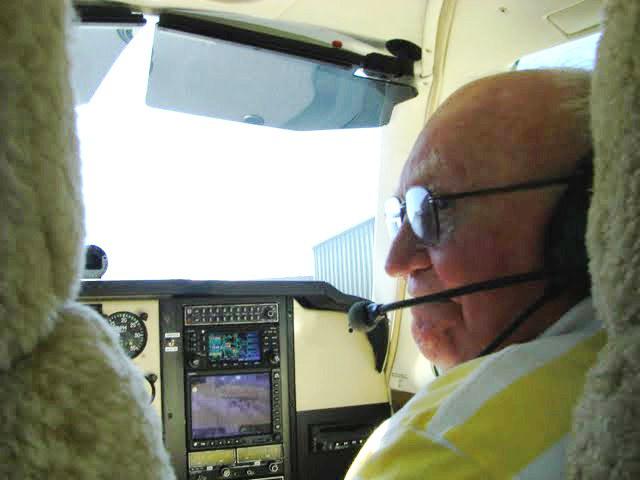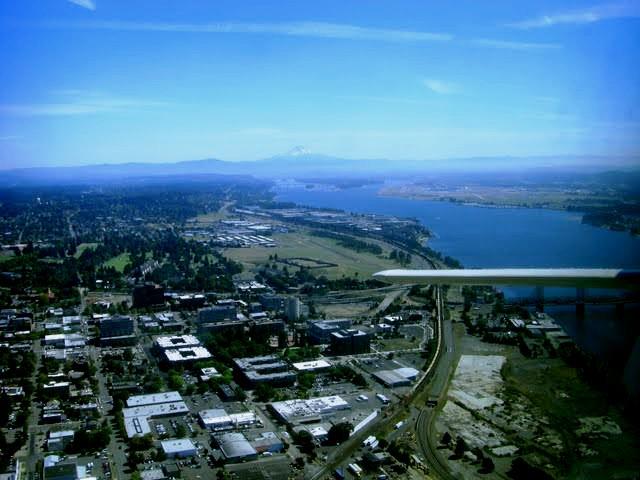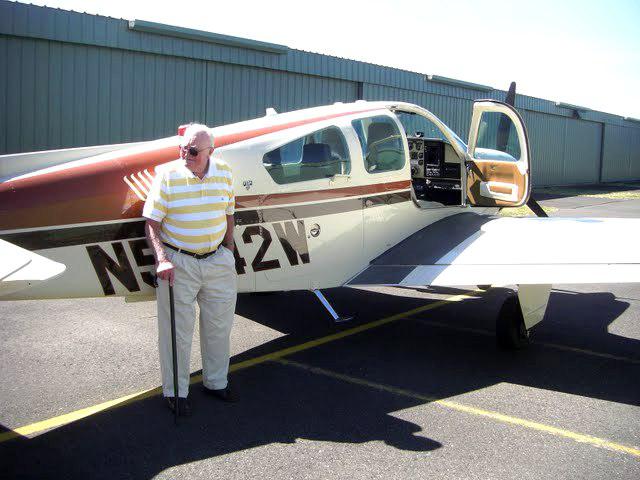Webmaster’s note: Article slightly modified for accuracy and tense from a submission by Timothy Conser, son of Allen Conser. We welcome your submissions!
Allan Henry Conser was born on December 28th 1916 in Portland, Oregon to Homer and Georgia Conser. He grew up in Portland and attended Portland Public Schools, graduating form Grant High School in 1937. His father was a regional automobile dealer for Moons and Stars, predecessors to General Motors products.
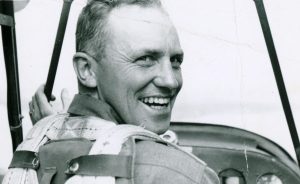
Allan developed a keen mechanical ability in the back rooms of the dealership and was driving by the age of 12. He and his brother Lodi joined the Civilian Pilot Training Program (CPTP) in 1940 flying out of Sunnyside, Washington about 100 miles Northeast of Portland. Automobile fuel was scarce and rationed during this period but aviation fuel for the CPTP was available and they found that the higher octane worked well in their car. This type of improvising proved to be a crucial skill in all Liaison Pilots.
After Pearl Harbor the Kaiser shipyards were busy in Portland where Allan was employed as a machinist and heavy marine repairman prior to induction. He married Lelah Elizabeth Brown of Astoria, Oregon in April 1941. They had three sons all of which served in the military, during Viet Nam. Two sons served in the Army; David a dog handler trained in San Antonio and Clifford, who retired with 38 years in the Oregon Army National Guard as a crew chief on helicopters and various fixed wing aircraft. Clifford was also the recipient of the Valley Forge Cross. Allen’s third son Timothy was in the Navy in communications.
The Army needed trained pilots with excellent mechanical skills. Liaison Pilots had to be able to fly and also maintain their aircraft. Allan converted his training under the CPTP and passed the Army pilot exams in Waco, TX. He joined the Army in October 1942 as a
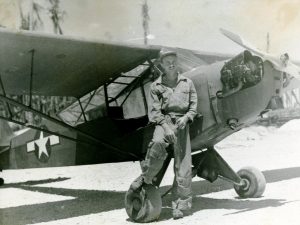
Liaison Pilot Staff Sgt. and received his artillery training at Fort Sill, OK in 1943. Upon graduation he was assigned to the 31st Dixie Division and shipped out to Morotai in Dutch New Guinea in the Pacific.
As a Liaison Pilot his primary duty was directing artillery fire on enemy targets. Other duties included delivering supplies and the mail to front line personnel. The liaison pilots earned the nick name of “Biscuit Bombers” when one day they dropped the mail into a vat of syrup on a mess line, “Sweet Letters from Home”. Every morning Conser would circle Morotai delivering mail and watch the shoreline for Japanese barges. When he would spot one he would pinpoint their location for P.T. boats. Several times his plane would return with bullet holes from small arms ground fire. One day he returned and his crew chief called him out to show him a line of 50 caliber machine gun holes. Soon after they arrived in the Pacific Maj. Brown his commander removed the seats in the L4’s and lined the bottom of the aircraft with armor
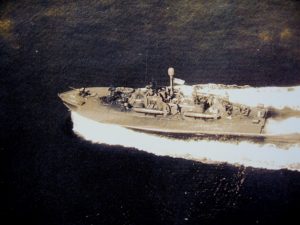
plating to protect the pilots and observers. With the gas tank between the pilot and engine the planes could take ground fire and stay airborne. Once, Conser had a run in with a Japanese Zero but was able to dive down to a river and move back and forth along the edge of the river bank flying under the overhanging tree line to avoid a clear shot from the Zero. He would often fly new replacement personnel to the front lines. His worst assignment was retrieving these green personnel or their remains, later in the week.
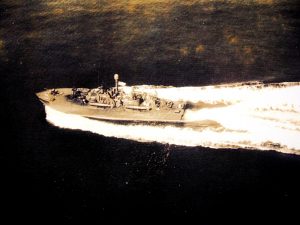
On one memorable flight Conser spotted a PT Boat on the horizon but could not raise them on the radio. So he flew to them boat and motioned for them to stop, he then cut his engine and glided over yelling out of the window to follow him. He had spotted a Japanese supply barge camouflaged on the edge of the shore line. He directed the PT Boat to the area were they launched mortars from out of range of small arms fire, destroying the barge. There are photos of this engagement.
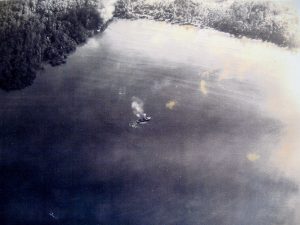
Allan was transferred to the 25th Division when they moved to the Philippines Islands after their battalion had lost two Liaison pilots in one day. He was awarded the Silver Star for gallantry in action against the enemy on May 5, 1945 in Mindanao by the commanding general of the 10th corps. “On this date, our Infantry was receiving heavy enemy artillery fire. Conser, although he had just returned from a long aerial reconnaissance flight, undertook to locate and adjust fire on the enemy artillery pieces. While searching the suspected area from a dangerously low altitude his plane was fired upon by enemy AAA guns. While adjusting artillery fire the enemy ground fire became more intense and accurate and in despite of repeated warnings to return to the field he remained over the enemy position until their guns were effectively silenced”. Conser was field promoted to Second Lieutenant in Sept. 1945. His WW II military record at separation under Decorations and Citations shows “Silver Star Medal: Air Medal with 1 Oak Leaf Cluster: American Theater Service Medal: Asiatic Pacific Service Medal with 1 Bronze Stars: Philippine Liberation Medal with 2 Bronze Star: World War II Victory Medal:”.
Despite these extraordinary men in extraordinary circumstances, Conser’s favorite story of his Pacific experience was a commendation that he received for saving a lost C-46 transport with 36 men aboard. He and his crew had acquired a Japanese kerosene refrigerator to keep their ice water (beer) cold during the hot Mindanao days. They had also come across a large red CO2 container on wheels that they thought would be handy on the flight line in case a fire ever occurred. When the refrigerator inadvertently caught fire the crew retrieved the red extinguisher to put out the fire. The Japanese apparently marked their tanks differently and they poured oxygen on the fire. The fire flared up over 100 feet. The pilot of the transport thought it was a signal fire marking the airfield for them and safely landed the transport which was running out of gas and running out of hope.
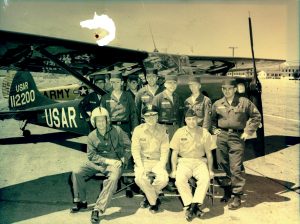
After the War Conser returned to Portland and worked for General Mills. He served in the Army Reserves for 20 years. He logged hundreds of hours as a Senior Army Aviator flying L-19 Birddogs, with the 104th Division Artillery Vancouver, WA. In 1957 he received a Commendation when a member of a Tank Battalion in Yakima, WA was injured in an impact area. A helicopter evacuation was requested, but all helicopters available were grounded due to high winds and limited ceiling. Conser at his own risk volunteered to fly and land his L-19 in this isolated area on an up hill, un-cleared bank on the side of the Columbia River gorge. He powered the aircraft as far up the hill as he could. They blocked the wheels, and turned it downhill toward the river gorge. The injured man was loaded aboard the plane and the evacuation was accomplished by running downhill about 150 feet and dropping into the Columbia Gorge. He pushed the nose of the aircraft over until enough air speed allowed the Birddog to pull out over the water.
Conser retired in 1967 as a Major. Until his death he lived in Portland, OR and and jumped at the chance to fly. Accompanying photos are from a flight out of Pearson Airfield in Vancouver, WA with a nephew. His comment was that there’s a lot of equipment in the cockpit today to distract you from what you’re up there to do, fly!
